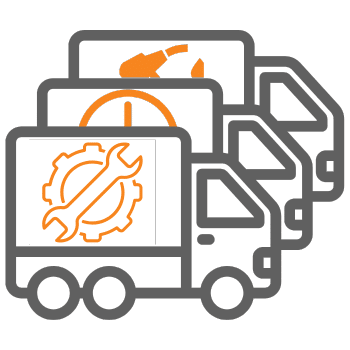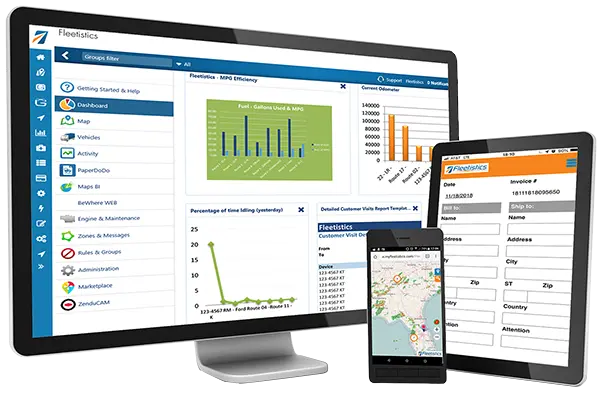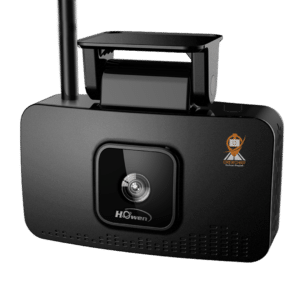Logistics efficiency and employee satisfaction are crucial elements that can make or break a company’s success. Fleet management software has emerged as a powerful tool for logistics companies, transforming operations by streamlining processes, reducing delivery times, and enhancing job satisfaction for both drivers and dispatchers. Fleetistics, a leader in fleet management solutions, provides comprehensive software that addresses these needs and drives significant improvements in logistics performance.


Streamlining Logistic operations with Fleet Management Software
Fleet management software offers a myriad of features designed to streamline Logistics efficiency. These features include real-time tracking, route optimization, maintenance scheduling, and automated reporting. By leveraging these capabilities, logistics companies can achieve a higher level of efficiency, which translates into faster delivery times and reduced operational costs.
Real-Time Tracking and Route Optimization for logistics efficiency
One of the most significant advantages of fleet management software is real-time tracking. Fleetistics’ software provides up-to-the-minute location data for every vehicle in the fleet. This capability allows dispatchers to monitor routes and make adjustments as necessary to avoid traffic congestion, road closures, and other delays. According to a study by Frost & Sullivan, real-time tracking can reduce travel time by up to 20% and decrease fuel consumption by 15%.
Route optimization is another critical feature that enhances logistics efficiency. By analyzing traffic patterns, delivery windows, and vehicle capacities, fleet management software can generate the most efficient routes for drivers. This not only reduces delivery times but also minimizes wear and tear on vehicles, leading to lower maintenance costs. In a report by the American Transportation Research Institute (ATRI), route optimization was found to improve fuel efficiency by 10-15% and reduce overall delivery times by 20%.
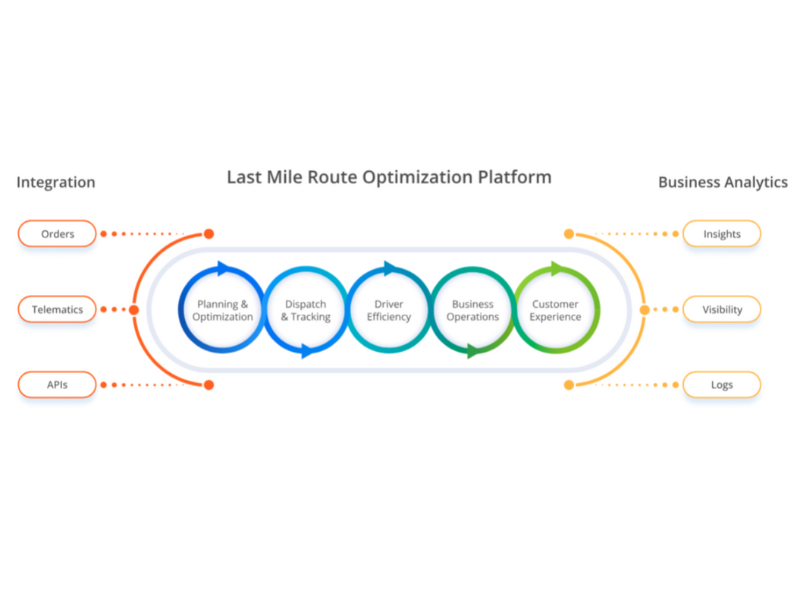
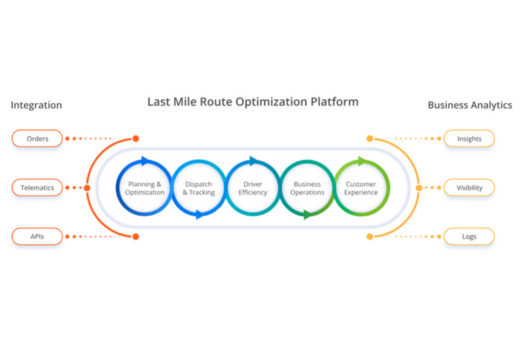
Maintenance Scheduling and Automated Reporting
Regular maintenance is essential for keeping a fleet in optimal condition. Fleetistics’ software includes maintenance scheduling tools that help logistics companies stay on top of routine service and repairs. Automated reminders for oil changes, tire rotations, and inspections ensure that vehicles are maintained properly, reducing the risk of breakdowns and extending the lifespan of the fleet. The ATRI reports that preventative maintenance can decrease vehicle downtime by 20% and reduce repair costs by 25%.
Automated reporting is another feature that significantly improves operational efficiency. Fleet management software can generate detailed reports on fuel consumption, driver performance, and vehicle health, providing valuable insights for decision-makers. These reports help identify areas for improvement, track progress over time, and ensure compliance with regulatory requirements. According to the Technology & Maintenance Council (TMC), companies that utilize automated reporting experience a 15-20% increase in operational logistics efficiency.
Enhancing Employee Satisfaction
While operational efficiency is vital, employee satisfaction is equally important for the long-term success of a logistics company. Fleet management software plays a crucial role in improving job satisfaction for both drivers and dispatchers by addressing their unique challenges and providing tools that make their jobs easier and more rewarding.
Improving Driver Satisfaction
Drivers are the backbone of any logistics operation, and their satisfaction directly impacts productivity and retention rates. Fleet management software enhances driver satisfaction in several ways:
- Reduced Stress and Fatigue: With real-time tracking and route optimization, drivers spend less time in traffic and on the road, which reduces stress and fatigue. According to a survey by the National Institute for Occupational Safety and Health (NIOSH), 60% of drivers reported lower stress levels when using route optimization tools.
- Better Communication: Fleetistics’ software enables seamless communication between drivers and dispatchers. Instant messaging and real-time updates keep drivers informed about route changes, delivery schedules, and other important information. Improved communication leads to fewer misunderstandings and a smoother workflow.
- Recognition and Rewards: Fleet management software can track driver performance metrics such as fuel efficiency, on-time deliveries, and safe driving practices. This data can be used to recognize and reward top performers, boosting morale and encouraging healthy competition. A study by the Society for
Human Resource Management (SHRM) found that employees who receive regular recognition are 23% more likely to report high levels of job satisfaction.
Enhancing Dispatcher Satisfaction
Dispatchers are the coordinators who ensure that logistics operations run smoothly. Fleet management software significantly improves their efficiency and job satisfaction by providing tools that streamline their workflow and enhance their ability to manage the fleet effectively.
- Simplified Workflow: With automated scheduling, route optimization, and real-time tracking, dispatchers can manage more tasks with less effort. The reduction in manual tasks allows them to focus on higher-level responsibilities, leading to greater job satisfaction. According to a report by the Aberdeen Group, dispatchers using fleet management software experience a 30% reduction in administrative workload.
- Improved Decision-Making: Access to comprehensive data and real-time insights enables dispatchers to make more informed decisions. Fleetistics’ software provides detailed analytics and reporting, helping dispatchers identify inefficiencies and optimize routes and schedules. The ability to make data-driven decisions enhances their sense of control and effectiveness.
- Enhanced Communication: Effective communication between dispatchers and drivers is crucial for successful logistics efficiency. Fleet management software facilitates instant communication, reducing the likelihood of misunderstandings and delays. A study by McKinsey & Company found that improved communication tools lead to a 25% increase in dispatcher satisfaction.
The Impact of Fleet Management Software on Employee Retention
Employee satisfaction is closely linked to retention rates. Satisfied employees are more likely to stay with the company, reducing turnover and associated costs. Fleet management software contributes to higher retention rates by creating a more supportive and efficient work environment for both drivers and dispatchers.
Data-Driven Employee Retention
Data supports the positive impact of fleet management software on employee retention. According to a study by the Trucking Industry Research Institute (TIRI), companies that implemented fleet management software saw a 15% reduction in driver turnover within the first year. This decrease is attributed to improved job satisfaction, better communication, and recognition of driver performance.
Moreover, the same study found that dispatcher turnover decreased by 10% in companies using fleet management software. Dispatchers reported feeling more empowered and supported in their roles, leading to greater job satisfaction and loyalty to the company.
Cost Savings from Reduced Turnover
Reducing turnover has significant financial benefits for logistics companies. The cost of recruiting, hiring, and training new employees can be substantial. According to the American Trucking Associations (ATA), the average cost to replace a driver is approximately $10,000. By reducing turnover through improved job satisfaction, companies can save on these costs and reinvest in other areas of the business.
Conclusion:
Fleet management software is a transformative tool for logistics companies, offering numerous benefits that enhance logistics efficiency and employee satisfaction. Fleetistics’ comprehensive solutions provide real-time tracking, route optimization, maintenance scheduling, and automated reporting, leading to streamlined operations and faster delivery times. Additionally, the software addresses the unique challenges faced by drivers and dispatchers, improving communication, reducing stress, and recognizing performance.
The positive impact on employee satisfaction is evident in the data, with significant reductions in turnover and associated costs. By investing in fleet management software, logistics companies can create a more efficient, supportive, and rewarding work environment, ultimately driving long-term success in a competitive industry.
Fleetistics continues to lead the way in fleet management solutions, helping logistics companies transform their operations and achieve new levels of logistics efficiency and employee satisfaction. For more information on how Fleetistics can benefit your company, book a free 15min demo today.
References
- Frost & Sullivan. (2022). Real-Time Tracking and Route Optimization.
- American Transportation Research Institute (ATRI). (2023). Route Optimization and Fuel Efficiency.
- National Institute for Occupational Safety and Health (NIOSH). (2023). Driver Stress and Fatigue Survey.
- Society for Human Resource Management (SHRM). (2023). Employee Recognition and Job Satisfaction.
- Aberdeen Group. (2023). Dispatcher Workload Reduction.
- McKinsey & Company. (2023). Communication Tools and Dispatcher Satisfaction.
- Trucking Industry Research Institute (TIRI). (2023). Impact of Fleet Management Software on Employee Retention.
- American Trucking Associations (ATA). (2023). Cost of Driver Turnover.
Get industry tips and insights
Sign up for monthly news and tips from our award-winning fleet management blog. You can unsubscribe at any time.
